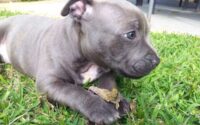White english pointer
The elegant White English Pointer, often simply known as the Pointer, is a breed of dog that has been a favorite among hunters and dog enthusiasts alike for centuries. With their graceful build, keen sense of smell, and remarkable intelligence, these dogs are not just companions but also skilled athletes in the field of game hunting. In this detailed exploration, we delve into the world of the White English Pointer, examining its hunting abilities, training requirements, health, the role in competitive dog sports, and what prospective owners should expect when adopting one of these magnificent dogs.
Discover the White English Pointer Breed
Table of Contents

The White English Pointer, commonly known as the Pointer, is a breed that epitomizes grace, agility, and strength. Its ancestry can be traced back to Spain, but it was in England where the breed was refined for its pointing abilities. The coat is predominantly white, with liver, lemon, black, or orange markings, giving each dog a unique appearance.
Typically, Pointers stand between 23 to 28 inches tall at the shoulder and weigh from 45 to 75 pounds, with a life expectancy of 12 to 17 years. Their characteristic traits include a muscular yet elegant build, a distinctively shaped head with a broad, deep muzzle, and large, expressive eyes that exude intelligence and alertness.
The breed is known for its high energy levels and requires plenty of exercise to maintain both physical and mental well-being. Their short coat is easy to care for, shedding modestly, and only requires regular brushing to remove loose hair and maintain its sheen.
Pointers are renowned for their loyalty and are typically very affectionate and gentle with their families. They also tend to get along well with children and other dogs, given proper socialization. Additionally, their inherent desire to please makes them a joy to train, although their exercise needs may be too demanding for some households.
As with many breeds, the White English Pointer has its own set of inherited health concerns, including hip dysplasia and certain types of allergies. Prospective owners should be prepared for the responsibilities that come with owning such an active and intelligent breed.
Unveiling the Pointer’s Hunting Prowess

The White English Pointer’s hunting prowess is legendary. These dogs excel in the field due to their incredible sense of smell and their instinct to point, whereby they freeze in a statuesque pose to direct hunters to game birds. Pointers are known for their ability to cover large areas of ground quickly, making them invaluable for hunting over vast terrains.
Their stamina is extraordinary, allowing them to work for prolonged periods without showing signs of fatigue. This makes them particularly well-suited for hunting in warm climates where other breeds might falter. Pointers are also adept at working in tandem with other dogs and following the commands of their handlers, showcasing their superb teamwork and obedience.
The breed is versatile and can be trained to hunt a variety of game, from quail and grouse to pheasants and rabbits. Pointers are non-retrievers, meaning their role is to locate and point to game, leaving the retrieval to other specialized breeds or the hunters themselves.
Their hunting style is often described as methodical and thorough, with a keen focus and intensity that is a sight to behold. When on the scent, a Pointer’s tail becomes an animated barometer of their excitement and concentration.
Pointers are not only effective on the hunt but also derive great enjoyment from the activity. It is essential for owners to understand that the hunting instinct is deeply ingrained in these dogs, and accommodating this drive is key to their happiness.
Pointer Training: Tips for Success

Training a White English Pointer requires consistency, patience, and a positive reinforcement approach. Here are some tips for achieving training success with this intelligent and energetic breed:
- Begin training early: Starting from puppyhood, establish good habits and basic obedience. Pointers are quick learners, but they can also develop stubborn habits if not guided correctly from the start.
- Use positive reinforcement: Pointers are sensitive dogs that respond well to praise and treats. Harsh training methods can be counterproductive and damage the trust between dog and owner.
- Keep sessions short and engaging: Due to their high intelligence, Pointers can become bored with repetitive tasks. Keep training sessions short, fun, and challenging to hold their attention.
- Incorporate plenty of exercise: A well-exercised Pointer is more likely to focus during training sessions. Make sure your dog has had a chance to burn off excess energy before expecting them to concentrate.
- Teach “whoa”: This command is crucial for a hunting dog, as it instructs them to stop immediately and hold their point. Training this command early on is beneficial for both hunting and general safety.
- Socialize extensively: Expose your Pointer to various environments, people, and other animals to ensure they are well-rounded and adaptable, which is particularly important for a dog that will be taken on hunting trips.
Health and Care for Your English Pointer

The White English Pointer is a generally healthy breed, but, like all dogs, they do have specific health concerns that owners should be mindful of. Here are some key points on maintaining the health and care of your Pointer:
- Vaccinations and Regular Check-ups: Ensure your Pointer is up to date with vaccinations and has regular veterinary check-ups to catch any potential health issues early.
- Exercise: Regular, vigorous exercise is crucial to keep your Pointer in good physical condition and prevent behavior issues associated with pent-up energy.
- Nutrition: Provide a balanced diet appropriate for an active, large-breed dog. Consult with your veterinarian to determine the best diet for your Pointer’s age, size, and activity level.
- Grooming: Pointers have a short, smooth coat that is easy to maintain. Weekly brushing will help keep their coat shiny and reduce shedding.
- Hip Dysplasia and Other Conditions: Be aware of common conditions such as hip dysplasia. Responsible breeding practices can help reduce the risk of genetic disorders.
- Mental Stimulation: Alongside physical exercise, Pointers need mental challenges to keep them engaged. Training activities, interactive toys, and hunting or tracking games can provide good mental workouts.
The Pointer’s Place in Canine Competitions

The White English Pointer is not just a skilled hunting companion but also a star in the realm of canine competitions. Their athletic build and sharp mind make them natural competitors in a variety of dog sports.
- Field Trials: Pointers are perhaps most well-known for their success in field trials, where they can demonstrate their hunting abilities and impress judges with their speed, stamina, and style.
- Conformation Shows: In the show ring, a Pointer’s physical attributes and movement are judged against the breed standard. These events showcase the breed’s beauty and poise.
- Obedience Trials: Due to their trainability, Pointers can also excel in obedience trials. These competitions test a dog’s ability to perform a variety of tasks on command.
- Agility Competitions: Although not as common, Pointers can also participate and perform well in agility competitions, navigating obstacle courses with focus and speed.
- Rally Obedience: This sport combines elements of obedience and agility, with Pointers needing to follow a course and perform tasks along the way, demonstrating their versatility.
- Dock Diving: For the more adventurous Pointer, dock diving events allow them to show off their leaping abilities and love for water, adding another dimension to their competitive appeal.
Adoption Comparison Table
| Factor | Adopting a Puppy | Adopting an Adult Dog |
|---|---|---|
| Training | Requires extensive training and socialization. | May have some training, but could require retraining. |
| Exercise | High energy levels, need lots of play and exercise. | Still requires significant exercise, but may be less demanding than a puppy. |
| Health | Must start a vaccination schedule and monitor growth. | Health history may be known, and immediate health needs addressed. |
| Adaptability | Typically adaptable to new environments. | May take longer to adjust to new surroundings. |
| Time Commitment | Requires significant time for training and care. | Might be more independent but still needs attention and time. |
| Bonding | Opportunity to form an early, strong bond. | Can form strong bonds, sometimes almost immediately. |
Adopting a Pointer: What to Expect

When considering adopting a White English Pointer, there are several factors to keep in mind:
- Energy Levels: Expect a dog with high energy levels that will require significant amounts of exercise and mental stimulation to stay happy and healthy.
- Space: Pointers do best in homes with plenty of space to move around. A large, securely fenced yard is ideal, but they can adapt to smaller spaces provided they get enough exercise.
- Time Commitment: Be prepared to invest time in training, socialization, and daily exercise. Pointers are social animals that thrive on interaction with their humans.
- Family Integration: Pointers are generally good with children and other pets, especially if raised together. But they can be exuberant, so supervision with small children is necessary.
- Hunting Instinct: The breed’s hunting instinct is strong, and this should be considered, especially if you have other small pets. Proper management of this instinct is key.
- Adoption Options: You can adopt a Pointer from breed-specific rescues, shelters, or responsible breeders. Consider the differences between adopting a puppy versus an adult dog, as outlined in the comparison table above.
The White English Pointer is a noble breed that exudes elegance and energy in equal measure. With their rich heritage as hunting dogs and their prowess in competitive sports, these dogs make for both affectionate family members and impressive athletes. Training and caring for a Pointer requires commitment and understanding, but the rewards are plentiful. Those willing to meet their needs will find a loyal and loving companion for life.



